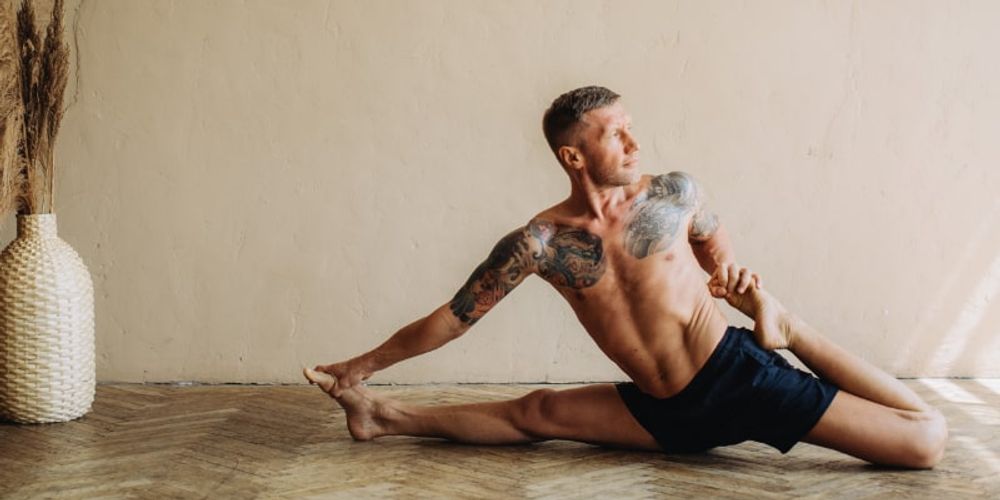Why Do Muscles Shake During Yoga?
-
 Dan Rivers
Dan Rivers
- 15 April 2023

Yoga can be a box of surprises for those starting out. We expect the practice to be chill with no roadblocks along the way, but one of the things that happen mostly to those who are new is that their muscles start to shake during yoga.
Certain poses are meant to expand our flexibility, but the price can come in the form of muscles shaking or feeling some sort of trembling. Over time, the shaking goes away and generally it’s no cause for concern, but the keyword here is generally.
It’s always best to follow the yoga instructor to the T, and muscle shaking can be a sign to stop and take a rest day from yoga. It’s believed that muscle shaking is due to physiological and neurological reasons, after all, yoga mimics some of the aspects of training.
Another cause for the muscles to shake can be attributed to poor sleep or not being hydrated. But assuming you got that covered, there can be many different reasons why your muscles shake during yoga.
It doesn’t hurt to get checked by a PCP on it just to be on the safe side. But for the most part, muscle-shaking is very normal.
Straining Yourself
One of the reasons your muscles might be shaking during a yoga session is that you are straining yourself and trying to push past what you can handle. But muscles can shake for many different reasons, even during training.
But assuming you are on the safe side and there’s nothing wrong with your muscles, expect some resistance when doing yoga.
You are, after all, becoming more flexible in the process. Straining yourself can be a double-edged sword, and you may choose to take gradual steps when becoming more flexible.
Growth
Intermediate yoga practitioners already pushed past that stage of muscle shaking, but it can happen to anyone, for reasons that are beyond what we can list in this article.
But one of the things yoga and physical training have in common is that they can both result in muscle growth, even if yoga doesn’t necessarily have that as its primary objective. It’s more a byproduct of training the mind and body and bringing them together.
With growth there’s often gonna be some form of resistance that can manifest in the form of shaking, so looking at it from that perspective, yoga isn’t that much different from exercise.
And while your muscles can shake during yoga, no matter how experienced you are, it’s more common to see this in those starting out and some might interpret it as a red flag to give up.
That’s why I mentioned what’s to come in the yoga so there’s no mismatch of expectations, yoga can be very blissful for sure, but it can also be difficult to keep certain poses, but those poses will often result in growth and muscles shaking are one of the many signs of that growth happening.
If you already know you are on the safe side, keep pushing and you’ll break past the barrier and enter the blissful part of yoga experiences.
Guided Yoga
Yoga is one of those things I don’t recommend doing without some form of guidance. There are many things that can go wrong, and with the right guidance in place, you could save yourself months if not years of mistakes newbies make when starting yoga, which propels them to quit.
This applies to almost everything else, but more so yoga, since it involves certain poses that, if done wrong, could cause strain and pain.
A certain pose can make your muscles shake because you are doing the pose incorrectly. It’s even better if you can get feedback on your practice to know you’re on the right track in your yoga journey and reap the rewards yoga has to offer.
Yoga doesn’t provide that exact same flexibility as meditation, in the sense that with meditation, it’s encouraged to go at it on your own, and you aren’t limited by having to keep certain poses.
Warming Up Before
Just like before exercise, it doesn’t hurt to do a few warmups before the yoga session. It reduces the risk of injury and puts your body in a state where doing certain poses may even be easier and you might not even encounter any of the shaking newbies often face.
Now, doing warmups isn’t a must and it’s more of a bonus tip on my part, not all yoga exercises benefit from a warm-up, since there are relaxing yoga poses that don’t require any straining. And even then, your muscles could still shake, even if you do things right.
Anything mentioned here is just guidelines that are by no means gospel and there are always exceptions, but warmups give you a layer of protection against muscle shaking.
Yoga Is New For The Muscles
I would say that this is the reason for straining, especially if you’ve never done yoga before and you’re gonna condition your mind to do certain poses that you’ve never done before.
I wouldn’t recommend any extreme poses unless you know you’ll be able to handle it, but if you’re doing something new, the body can react a certain way as a fight-or-flight instinct.
The longer you practice, the longer doing these poses become second nature, and the less you’ll notice the shaking, eventually.
But don’t omit following up with how you feel by the end of each yoga practice as that should be a key determinant of whether to continue or not, regardless of what anyone tells you. Yoga isn’t necessarily a straining exercise, that’s what the gym is for, even if some use yoga for that purpose.
Shaking isn’t just limited to yoga. Yoga might be a trigger, however. But your muscles could shake for a number of different reasons and may not be a yoga thing, so it’s worth being aware of that before pointing fingers at yoga for being the culprit.
Most shaking produced by yoga is generally believed to be safe and part of the process, but there will always be exceptions.
It can help to add a yoga mat to increase comfort, as that alone might keep your muscles from shaking in the first place. A yoga mat is also used for regular exercise or meditation in many cases.
It’s a good idea to abstain or reconsider doing yoga if you are feeling some sort of fatigue since yoga can require a sizable part of your energy and ideally, you’ll want to be at your best physically when doing the practice, as the practice is a great magnifier and extension of other habits such as exercise.
Once your diet, sleep and hydration are in the right place and assuming you get the green lights from a PCP to do yoga, you are generally gonna be on a safe path, and almost any discomfort you experience during the session is a stepping stone for growth.
Keeping certain poses can be challenging, but it pays off in the long term and you’ll find yourself freer in the sense that you are more flexible.
Don’t let the roadblocks you might experience from yoga scare you away from the practice and be willing to give yoga a try for a sustained amount of time to determine whether it’s for you or not.


